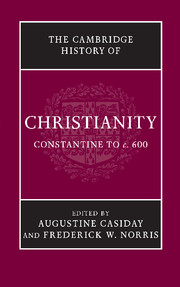Book contents
- Frontmatter
- Introduction
- Part I Christianity: Regional Developments
- Part II Christianity Contested
- Part III Christian Culture and Society
- 13 Towards defining a Christian culture: The Christian transformation of classical literature
- 14 Bishops and society
- 15 Synods and councils
- 16 The growth of church law
- 17 The church, society and political power
- Part IV Christian Beliefs and Practices
- Index
- Map 1 The Roman empire, c. 400">
- References
15 - Synods and councils
from Part III - Christian Culture and Society
Published online by Cambridge University Press: 28 March 2008
- Frontmatter
- Introduction
- Part I Christianity: Regional Developments
- Part II Christianity Contested
- Part III Christian Culture and Society
- 13 Towards defining a Christian culture: The Christian transformation of classical literature
- 14 Bishops and society
- 15 Synods and councils
- 16 The growth of church law
- 17 The church, society and political power
- Part IV Christian Beliefs and Practices
- Index
- Map 1 The Roman empire, c. 400">
- References
Summary
‘Throughout the provinces of the Greek world’, writes Tertullian, ‘councils are gathered out of every church’ (On fasting 3.6). The Latin ab universis ecclesiis must refer only to churches within the same district, for in the 1,950 years that have now elapsed since the ‘Apostolic Council’ in Jerusalem, there has not been one occasion on which the leaders of all the churches have assembled in the same locality. In Tertullian’s day such a gathering might have been conceivable, but could hardly have been convened without the mandate, or sustained without the resources, of an emperor. The synods of which we hear are generally local ones – the commonest, and consequently the least often reported, being no doubt a small conclave between a bishop and his presbyters to rule on a single matter within the diocese. The bishop might then communicate the judgment to other bishops, as Serapion did when he confiscated the Gospel of Peter in Antioch (Eusebius, Church history 6.12); and where a decision touched the interests of other congregations, the defence of it might be addressed not to the major sees alone but to the clergy of a whole province. Even then, the purpose of such a document as Victor’s letter announcing his suppression of the Asiatic date for Easter in Rome was to enjoin compliance, not to arouse debate (ibid. 5.24.9). Victor had already obtained the signature of the bishops outside Asia to a protocol approving the imposition of a uniform date for Easter in the capital; their colloquy might almost be called ecumenical, but no minutes have survived.
Keywords
- Type
- Chapter
- Information
- The Cambridge History of Christianity , pp. 367 - 385Publisher: Cambridge University PressPrint publication year: 2007
References
- 2
- Cited by

